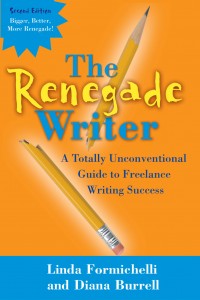It’s Formichelli Week on A. Victoria Mixon, Editor, with a guest post from Linda Formichelli of the Renegade Writer Blog. I first met Linda two years ago when I was a member of an online critique group (scoping out the current state of peer critiquing among fiction writers—ye gods!) and she joined as research for an article on writing forums for Writer’s Digest. Since then I’ve seen her crop up regularly in the online writing community, most recently as one of the Top 10 Blogs for Writers. She is the co-author of The Renegade Writer: A Totally Unconventional Guide to Freelance Writing Success.
And she’s not afraid of drinking blue things.
 GUEST POST BY LINDA FORMICHELLI
GUEST POST BY LINDA FORMICHELLI
Several years ago I wrote an article for a newsstand health magazine on how to turn your typical fatty BBQ into a healthful meal. My lede for the article was, “It’s summertime, and the living is greasy.”
When the article was published, I excitedly flipped to the right page, started reading—and was horrified. An editor had changed my lede to, “In summer, the living can sometimes be greasy.”
Okay, maybe the editor was 20 years old and had never heard of the (famous!) song that my lede was playing off of. But still, couldn’t she at least have changed it to something that made sense? I worried that readers would think that I actually wrote that clunker of a sentence.
Then I remembered my motto: “As long as you spell my name right on the check, I don’t care what you do to the copy.”Okay, I’m being facetious—of course I care. But once the magazine editor has my article, it’s out of my hands. I can’t control what happens to my writing, so it doesn’t make sense to get my panties all in a twist when an editor tweaks my prose, no matter how badly (in my opinion) it turns out.
I know what you’re thinking: “Sure, but you’re a magazine writer. . .you write articles like ’10 Minutes to Thin Thighs’ for—ugh—money. I create art. I couldn’t stand to have someone change the words I’ve sweated over.” But any published fiction writer (and every bestselling author) will tell you that editors will edit your writing, sometimes in ways you don’t like—and you can either be a diva or be a professional about it. (Guess which one will get you published again?)
Here are three ways to divorce yourself from your work enough that you won’t suffer a cardiac infarction every time an editor suggests a change.
This is a writing term that means to get rid of apiece of prose that you’re especially wedded to. For example, you may have slaved over the perfect prologue that explains the background details readers will need to know to understand your plot. What if you throw it out and weave the background information into the story itself? It will hurt—after all, you spent days crafting that prologue—but your story will likely be stronger in the end. The same can be said for many article ledes: most of them are mere throat clearing, and the real article starts on paragraph two. Throwing out your baby shows you that changing your story, even in ways that are painful at first, can improve your work.
2. Trust the boss.
When an editor changes my article beyond recognition I tell myself that the editor knows her magazine’s readers better than I do. The same can be said for the professional editing your novel or short story. She’s reworked plenty of writers’ words and has a good sense of what works for readers and what doesn’t. Let go and trust.
3. Put it aside.
When you’re pounding the keyboard for days in a caffeine-fueled haze, it’s hard to get distance from your work. Everything is perfect and you wouldn’t change a thing! But try putting your work aside for a few days and then coming back to it with fresh eyes. Hmmmm. . .you never noticed before how clunky that transition was. And did you really think that humorous aside was a good idea? Now you can see that your first iteration of a work isn’t necessarily perfect—and neither is your second or your third, as you’ll see if you keep giving yourself breathing room in between drafts. An editor gives you yet another fresh perspective and can help you tighten your writing even more.
Of course, you’re welcome to ignore an independent editor’s suggestions and even to try to talk a magazine editor out of a change—if you do it with professionalism and understand that the magazine editor has the final say. But remember that it’s easy to lose perspective when you get too close to your own work, and that can lead to inferior writing, not to mention freakouts of major proportion.
Maintain the professional mindset: editing exists to help your work shine.
 Linda Formichelli is a full-time freelancer who’s written for more than 130 magazines, from Pizza Today to Woman’s Day. She’s the co-author of The Renegade Writer: A Totally Unconventional Guide to Freelance Writing Success. Linda runs the Renegade Writer Blog, where she dishes out advice and offers an e-course on breaking into magazines, phone mentoring for freelance writers, and a free packet of 10 sample query letters. She can also be found on Twitter.
Linda Formichelli is a full-time freelancer who’s written for more than 130 magazines, from Pizza Today to Woman’s Day. She’s the co-author of The Renegade Writer: A Totally Unconventional Guide to Freelance Writing Success. Linda runs the Renegade Writer Blog, where she dishes out advice and offers an e-course on breaking into magazines, phone mentoring for freelance writers, and a free packet of 10 sample query letters. She can also be found on Twitter.


Great post Linda! You’re giving me flashbacks to a couple of great opening lines I’ve had mangled by editors…
And it’s true. I’ve seen chat in A-List Bloggers club from brand-new guest posters on blogs about their shock at seeing their work edited…but it’s a reality of life as a freelance writer.
Love it! I’m fond of the analogy of writing to a relationship (particularly the idea that warm fuzzies aren’t enough; we have to committed for the long haul). Along with that analogy comes the inevitable “divorce procedure” we have to endure at the end of a story or article. Sad as we may be to let go, we have to move on to the next relationship.
Thanks, guys! I’m glad you like the post. K.M., great analogy — writing a piece for publication IS like a relationship.
Gaining distance from your writing is tough but incredibly necessary! Still, I’d have been plenty horrified by that “summertime” edit. I may be young, but even *I* know that reference and can’t imagine changing it to something else. But hey, hopefully you got paid on time, right? 🙂
As usual, Linda comes through with good advice. I tweeted and fb shared this.
Thanks, Karen! That’s so nice of you!
Susan, I think that’s one of a mere handful of times I’ve been horrified by an edit — and that’s in over 13 years! Whew — lucky for me terrible edits are few and far between. And — yes, I id get paid on time! 🙂
Thank you for your post, Linda! That reference to “Summertime” got stuck in my head last night, and I wound up tweeting ridiculous lyrics in reference to your article. 🙂
I’m surprised you didn’t just come right out and say “be sure to read this, Jeffrey!” Thanks for the polite ommission… 🙂
Thanks for having me! And too funny — it’s a catchy song, isn’t it?
Linda, I love your idea of breaking up with your writing. Not getting too emotionally attached is hard. I see all my writing as a work in progress. Some will like it, some will not.
Thanks, Marci! I know it’s hard, and I think that time, experience, and practice do help writers let go of their work a bit.